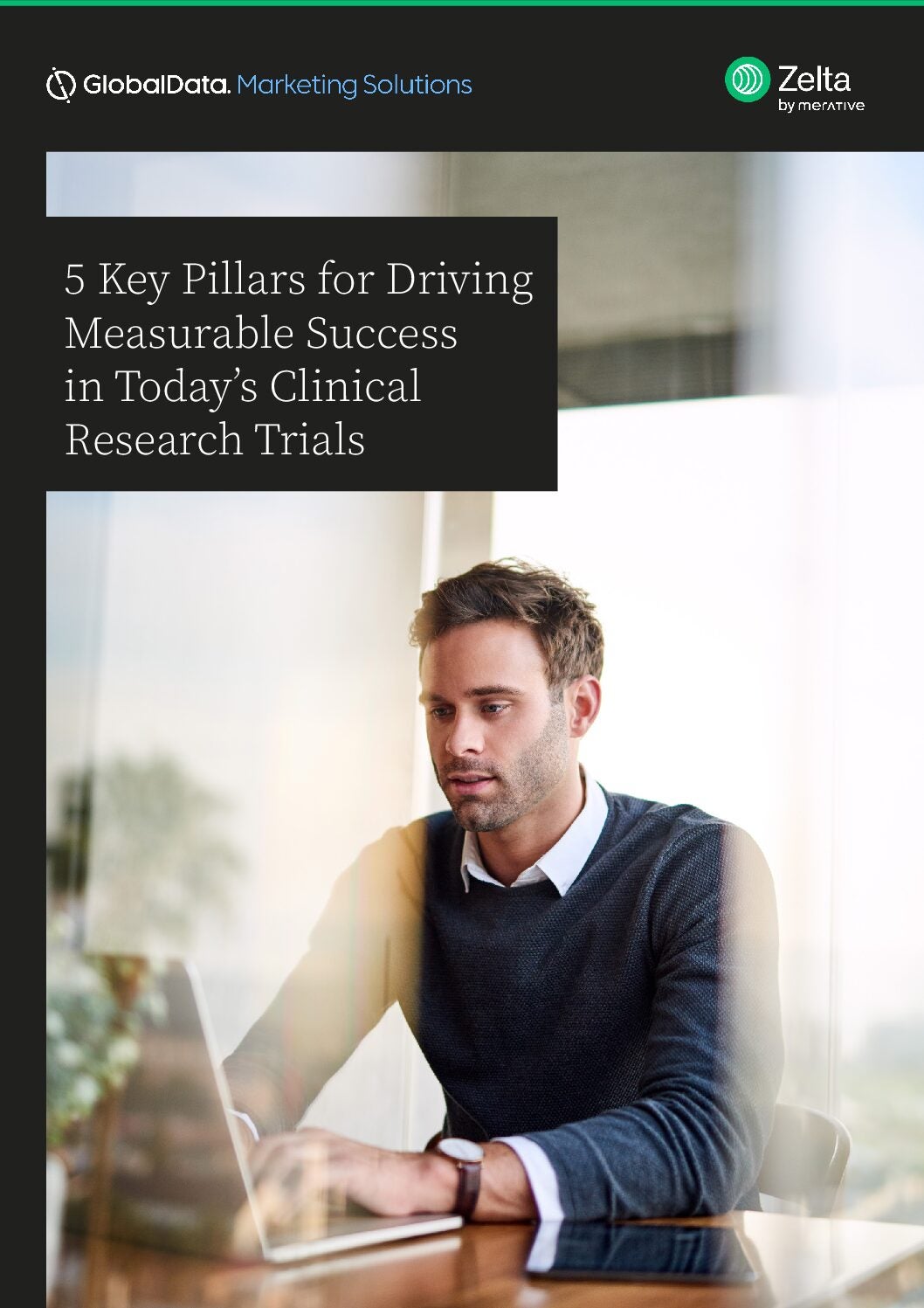
While the digitization of clinical trials has enabled easier access to participant data, including electronic consent forms (eConsent), electronic patient outcomes (ePRO), electronic clinical outcome assessments (eCOA) and electronic data capture (EDC), getting the most out of cloud’s capacity for data collection, storage, and sharing hinges on sponsors and CROs partnering with expert providers.
At present, SaaS solutions make up 30% of the market, with 70% being non-SaaS. Yet this could soon change. GlobalData forecasts that global spending by pharma companies on cloud services will increase to $7.3bn by 2026, with the greatest proportion ($4.5bn) invested in SaaS providers. SaaS platforms enable customers to subscribe to an application rather than purchasing the software once and having to manage it themselves.
This can be of great benefit to clinical trial operators, reducing long-term trial costs while still guaranteeing accurate and secure participant data. However, to help rather than hinder a trial’s progress, any SaaS solution must be flexible, intuitive, and secure from cyberattacks.
“I spent most of my career working with enterprise solutions, and all I could think was: ‘Why is this so hard?’” says Jennifer Duff, general manager at Zelta Clinical Trials Solutions. “Simplification of technology and solutions built off shared learnings and ideas is a good thing for clinical research.”
Finding the right vendor in a crowded market
Considerable amounts of time and expenditure are involved with drug discovery and development, which has historically taken around 12 to 18 years, with costs averaging $2bn-$3bn. Furthermore, the margins of success can be low, with GlobalData research suggesting that just 10% of potential drugs progress to clinical development. To address such challenges and reduce costs, many CROs are turning to technologies such as SaaS and cloud software.
Unlike an enterprise partner arrangement, where the customer buys access to software once and manages it themselves on their own infrastructure, SaaS providers often offer more flexible commercial packages that allow organizations to see ROI much earlier. The fundamentals of cloud-based software allow clinical trial operators to bypass the hidden long-term costs that often come with enterprise infrastructure, including maintenance from a dedicated internal IT team to update and monitor the system.
Employing a subscription-based SaaS system that is continually updated by its providers can help CROs avoid hidden technology-related expenses and ensure a sponsor’s funding is being allocated efficiently. Updates and potential bugs can be addressed far more efficiently and proactively, which is essential for protecting the integrity of clinical trial data and reducing inefficiencies. Additionally, using SaaS solutions typically provide better overall customer support, better interoperability, and improved security and compliance.
The advantages of collecting and storing data in the cloud have led to a rapid increase in the quantity of SaaS offerings targeted at clinical trials. Potential customers should choose carefully to get the most out of their provider, as the digitization of clinical trials is still relatively new and many solutions on the market have not reached maturity.
A unified cloud-based SaaS platform for clinical trials
One platform that has a proven track record in flexibility, scalability, usability, and efficiency is Zelta, an industry-leading, cloud-based eClinical platform for clinical trials, offered by Merative. With integrated EDC, AI-enhanced medical coding, randomization and trial supply management (RTSM), and eConsent and ePRO/eCOA features that can be toggled on and off according to trial requirements, Zelta is a comprehensive SaaS solution that can reduce inefficiencies for clinical trials of any research area (pharma and device), phase, or complexity.
Robust SaaS offerings such as the Zelta clinical trials platform are designed to be user-friendly and require no additional staff to implement the digital infrastructure.
“We believe that Zelta is a true software as a service, providing an interface that is intuitive and allows non-programmers to design complex trials themselves,” explains Walker Bradham, product management lead for Zelta.
“The interface doesn’t require manual programming for additional features.“
Sara Vaidaya, Director of Data Management, Biorasi
The intuitive usability of Zelta helps support staff and can reduce the burden from high staff turnover seen in the clinical trial world by reducing training times. Furthermore, all learnings from previous clinical trials can be reused to benefit future studies, not just the ones a given sponsor or CRO has run. Sites and their support staff can access every study they participate in that is active on the Zelta SaaS solution via a single login set up, to grant them true single-sign-on access, regardless of sponsor or CRO.
“The data isn’t created in a vacuum or confined within a silo. It’s accessible across your study portfolio, no matter what comes next in your portfolio,” adds Duff. “Having that continuity of access to everything you’ve already done, combined with all the learnings from all users of the system, enables us to build out powerful capabilities into the Zelta solution that can be brought forward to use in your studies.”
“Repeatability is something that our customers have found a lot of value in. That ability to take components of studies that they’ve run before or have ongoing, and replicate those in future studies, whether it’s the entire study design or specific components of it,” says Bradham.
Using SaaS to reduce clinical trial inefficiencies and accelerate timelines
With Zelta, there is significant reduction in time-consuming data cleaning because its real-time error detection capabilities allow users to correct data as they enter it, so inaccuracies or anomalies can be identified immediately. Zelta’s streamlining capabilities have helped CROs achieve in two weeks what would normally otherwise take two months for non-SaaS platforms to achieve.
“One of the driving forces of inefficiency in this industry and greatest opportunity areas is the speed of decision making, which directly ties to access to data and information,” notes Duff.
One Zelta user, MMS Holdings, saw the benefits of using Zelta’s cloud-based platform to enable its teams – which are beholden to tight timelines – to access clinical trial data worldwide, and organize and analyze data from anywhere in the world. With these benefits, MMS was able to reduce study build time by three weeks, compared to the requirements of larger EDC platforms.
“This means we were able to address issues and speed up decision-making to avoid problems proactively, to keep clinical studies on the timeline,” says Doreen Van Huyssteen, Senior Manager of Data Management, MMS Holdings.
The reliability of SaaS providers is all the more crucial given the growing importance of decentralized clinical trials (DCTs). According to GlobalData, the volume of DCTs increased by over 380% between 2010 and 2022, with the COVID-19 pandemic a major driving factor in this trend. A key enabler of DCTs was having a central platform for remote data upload, monitoring, and exchange. Zelta’s user-friendly interface provides participants with the confidence to enter their data accurately, on their own, without having to be at the trial site.
“We want to be able to modernize, support, and invest in these technologies,” adds Duff. “We are focused on solutions that improve the clinical and participant experience and the success of the overall trial.”
With more innovative updates in the pipeline, Zelta is the user-tested SaaS system to get clinical trials of all types off the ground and into the cloud – fast, efficiently, and cost-effectively.
To learn more about the advantages of Zelta for CROs and sponsors looking to simplify their clinical trials, download the specially commissioned report below.
Click here to read more exclusive Zelta content.



